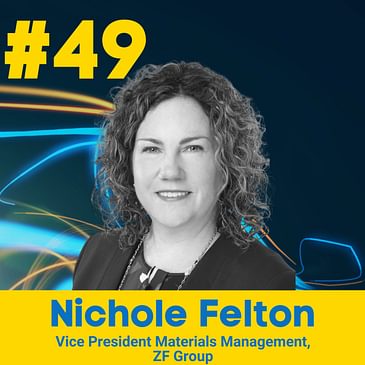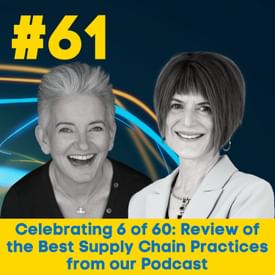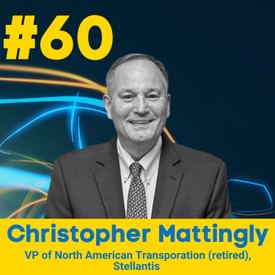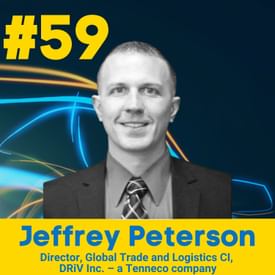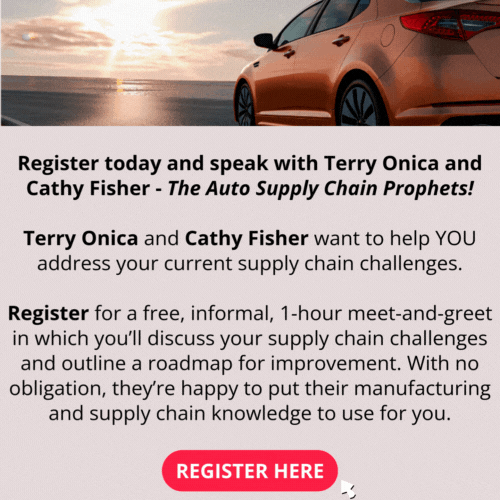In this episode of the Auto Supply Chain Prophets podcast, hosts Terry Onica and Jan Griffiths welcome Nichole Felton, Vice President of Supply Chain for ZF North America and board member for AIAG. Nichole gives a glimpse into her role, tackling challenges like global compliance regulations and ensuring a unified approach for a North American regional role within a German-based company. They discuss upcoming supply chain challenges, covering trade regulations, sustainability, anti-dumping measures, semiconductor restrictions, and the roles of industry organizations like AIAG and MEMA.
Nichole highlights the importance of technology, AI, and industry partnerships in improving data quality and sustainability efforts. The episode concludes with a discussion on women in supply chain leadership and advice for supply chain leaders. Nichole offers empowering advice to female professionals in the automotive industry, encouraging them to be vocal about their career goals and seek advocates. Additionally, she emphasizes the need for personal development among supply chain leaders to tackle future supply chain challenges effectively.
This episode provides a direct and practical overview of current automotive supply chain challenges and future considerations, featuring Nichole's extensive industry experience.
Themes discussed in this episode:
- The importance of women empowerment initiatives in manufacturing and supply chain
- Global compliance and trade regulations within the automotive sector
- Addressing forced labor concerns
- Overcoming organizational silos and promoting effective communication
- Strategies for tracing and managing complex supply chain data
- Sustainability challenges, including anti-dumping measures and semiconductor restrictions in the supply chain.
- Embracing technology, AI, and collaborative efforts for improved data quality and sustainability in the supply chain
- Women in leadership, advocating for oneself, and the importance of personal development goals
Featured on this episode:
Name: Nichole Felton
Title: Vice President of Supply Chain, ZF North America
About: Nichole is a proven global supply chain executive in the automotive industry. With a remarkable international track record, she excels in motivating high-performing teams to achieve strategic objectives. Nichole has held key leadership roles, including Thermal Segment Director and Corporate Commodity Executive, showcasing her expertise in achieving business results and pursuing new growth opportunities.
Connect: LinkedIn
Mentioned in this episode:
Episode Highlights:
[03:35] Future challenges: A conversation about the upcoming challenges the automotive supply chain will encounter in the next 2-5 years.
[05:21] Data and Communication: Explore the complexities of acquiring and managing supply chain data and the essential roles industry organizations like AIAG and MEMA play in fostering collaboration and communication within the automotive supply chain.
[12:48] Breaking Down Silos: Nichole's opinion on organizational silos emphasizes the need for agile solutions and an enterprise-wide approach to ensure wise decision-making. Also, learn how corporate leaders can collaborate effectively with plant managers for a cohesive supply chain.
[16:25] Empowering women: Nichole shares empowering advice for women in the industry, encouraging them to vocalize their aspirations, seek advocates, and overcome common barriers to reach leadership positions in the supply chain.
[20:57] Advice for supply chain leaders: Nichole wraps up with valuable advice for supply chain leaders, emphasizing the importance of personal development goals alongside professional ones.
Top Quotes:
[07:45] Nichole: “I think the industry partners with AIAG and MEMA, for which we're both board member companies, is really critical. It helps us to stay in touch with other companies and what they're doing around this space.”
[08:30] Nichole: “Being active in those trade organizations and understanding what other companies are doing to the extent that they can share and feel comfortable sharing is really important.”
[13:50] Nichole: “If you have people who can think with an enterprise view and not get hung up on their own metric to be successful but really make smart decisions about the overall business, I think that's where talent really shines.”
[15:47] Nichole: “If I'm a plant manager, I want to know the benefit for me. Why should I enact and be passionate about your corporate directive? And if I can show the benefit to a plant manager in the idea, that's where the magic happens. I can get inspiration and passion from a plant manager when they see that there's a benefit for them, either directly from their cost, operational efficiency, or something that's going to make the life of their plant better.”
[18:46] Nichole: “We as women cannot put our heads down and think someone's going to notice we're working hard. You have to be vocal about what you want.”
[21:24] Nichole: “It's really easy for us to sit down and think of all of the work and employment goals that we're going to come up with within our action plans. But I would also say that your personal development is really important. Don't forget to think about your development goal for the year.”
[Transcript]
[00:00:04] Jan Griffiths: This is the Auto Supply Chain Prophets podcast, where you'll hear from experts of all facets of supply chain in the auto industry to help you prepare for the future. I'm Jan Griffiths, your co-host and producer.
[00:00:17] Terry Onica: I'm Terry Onica, your podcast co-host. Let's dive in.
[00:00:23] Jan Griffiths: Hello and welcome to another episode of the Auto Supply Chain Prophets podcast. Let's check in with my co-host, Terry Onica. Terry, what have you been up to?
[00:00:31] Terry Onica: Our CEO started a woman empowerment group, and he told us to go out and work with customers and really teach them about women in manufacturing and supply chain. And so, this coming up Thursday, I'm going to Companion Bakery, and we're going to talk to a bunch of high school students and show them the bakery and how you make bread and the whole manufacturing process. And so, I'm super excited to do that.
[00:00:55] Jan Griffiths: Wow, that's great! And kudos to your CEO for launching that initiative, that's awesome. I love that. Well, I got to tell you, Terry, I've been working on my book. And I have to tell you, I mean, it's about authentic leadership in the automotive industry, but I have to tell you, I completely underestimated what's involved in publishing a book. And I will tell you that that's probably indicative of everything in my career ever. I totally underestimate. I have these great ideas and I say, "Yeah. That's it. We need to do that." Because I'm the visionary in the creative, right? I'm not into the details, and I know I'll figure it out, but I don't often know the plan or how to get there. And so, as I think about our guest today, she is somebody that is definitely, to your point, she is an empowered woman. There's no question about that. Just by the virtue of the position that she holds. But she is not somebody that's going to underestimate the task. She is somebody that's going to understand exactly what's involved for all the initiatives that she takes on; all that are forced upon due to the nature of compliance in our industry are forced upon the company that she works for. She is Nichole Felton; she is the Vice President of Supply Chain for ZF. Yes, I'm going to say ZF because I'm a Brit. ZF North America and she's also a board member for AIAG. Nichole, welcome to the show.
[00:02:29] Nichole Felton: Thank you. Thank you for having me.
[00:02:31] Jan Griffiths: So, tell us a little bit about your role, Nichole. I mean, supply chain, we know supply chain can be defined; it can cover so many different things in your organization. What does that look like for your role at ZF?
[00:02:45] Nichole Felton: Yes. It's a very interesting role working for a global company headquartered and based in Germany and having a North American regional role. So, a lot of the things I do are looking at trade and compliance regulations, government regulations, and how we, as a company, are going to be compliant to those. Do we have a global process already? Do we need a standalone process just to be compliant in North America? And how do I wrap those all together so that we have the voice of the region within a big global company?
[00:03:19] Jan Griffiths: Wow. That sounds really challenging. I'm assuming you have a dual reporting relationship. How does that work?
[00:03:26] Nichole Felton: I do. I have a solid reporting line to Martin Fisher, who's the member of the board of management, and a functional dotted line reporting to the CPO.
[00:03:35] Terry Onica: So, what are some of the challenges that you see in supply chain in the next two to five years? What are some things that are on the top of your mind that you're working on?
[00:03:43] Nichole Felton: So, I touched on some of the challenges a little bit, you know? In addition to keep the business running and all of the normal supply chain topics, I'm watching new and evolving trade and sustainability regulations. And when we think about sustainability, you know, it's a common buzzword. We all are using it and it means so many things. And so, for us in the US, when I think of sustainability, I think of forced labor and the U-F-L-P-A, the Uyghur Forced Labor Prevention Act, which really puts a lot of ownership on us as suppliers to understand our supply chain and all of the sub-tiers and where all of our product is coming from. And it's unique in that it puts a very big risk of good detentions, good detention back on the supplier, back on us. And we have to be prepared for that goods detention. And how do we practice and make sure we can be compliant, and how do we prepare for that? Also, there was a recent petition for anti-dumping and countervailing duties that rose in October of 2023. We're watching that in the comment period, really trying to keep our ears and eyes open around those trade regulations. The CHIPS regulations impacting what types of semiconductors we can use and import and export. And then, of course, the evolving CO2 initiatives and carbon neutrality initiatives that are really important in Europe right now, and I think will make its way to the U. S. in the coming months and years.
[00:05:21] Terry Onica: So, what are some of the challenges you have or how are you managing going deeper in the supply chain to get that data from your suppliers?
[00:05:29] Nichole Felton: It's really a complex topic, and I feel like we, as not only ZF but also an automotive industry, are chartering some new waters. We've always known that it was important to know where our goods were coming from, but we usually just have visibility to the first tier, maybe the second tier if there's a problem, but really, all the way down the supply chain is complex. Because how do you prove where things are coming from? How do you show due diligence? And we have to rely on third-party providers who have really done a great job developing AI tools based on import-export records, material movement, financial records, company ownership records. And I've been working very closely with AIAG and our industry partner and with MEMA. AIAG has developed a lot of working groups and has just released a forced labor and human rights page, which gives a tremendous amount of resource information for companies looking to explore and be prepared for this compliance topic.
[00:06:37] Jan Griffiths: You know, Nichole, listening to you talk takes me back to my supply chain days, right? And don't you just love it when people that don't understand the complexity of the supply base and the supply chain say things in a meeting like, "Yeah, we'll just send them an email and get that information and give us a report like by the end of the week, yeah? Okay, we good with that?" Do you see that sometimes people just don't understand what's involved and how difficult this task is?
[00:07:04] Nichole Felton: Yeah. I mean, for one supplier, we might have five or ten lines of sub-supplier data that have to be checked and double-checked and verified. And we have tens of thousands of suppliers and hundreds of thousands of part numbers. So, it's really massive.
[00:07:21] Jan Griffiths: And it keeps changing. So, how do you keep up with the changes? That was always a problem, right? Because suppliers change, people change, emails go unanswered. How do you keep these things updated all the time?
[00:07:33] Nichole Felton: Not only the changes in contact information but the changes in part numbers and the changes in our organizations as we have turnover. And so again, I think the industry partners with AIAG and MEMA, for which we're both board member companies, is really critical. It helps us to stay in touch with other companies and what they're doing around this space. Also, it would be really great if we, as the automotive industry, could coalesce around some data providers and platform providers. In case there's an industry-wide issue, how do we gather and aggregate data for us as an industry to be a voice for these regulations? Do we have industry-wide issues, or is it just, you know, ZF alone on their own with an issue? And I think that could be really powerful. And so being active in those trade organizations and understanding what other companies are doing to the extent that they can share and feel comfortable sharing is really important.
[00:08:40] Terry Onica: Here's where I think AIAG can play a tremendous role in the industry is by getting everybody around this. And really, there's so much great information at AIAG. And a lot of people just don't know about it, right? So, I think that's where AIAG can play this tremendous role, help people get their arms around it because, I'm sure Nichole, as you go lower down the supply chain, these smaller suppliers aren't going to know where to start with this. And so those resources that AIAG brings, I think, is so tremendous in really helping bring the community together. And I think we're on a really good start, and I hope AIAG continues to do more like what you're saying. Do you agree?
[00:09:21] Nichole Felton: I absolutely agree. I mean, we've just talked about forced labor. But think about CO2 and carbon neutrality and the regulations that have been very prevalent in Europe but have not been so prevalent and vocal here. We also have to drive that down the supply base and educate our suppliers to talk to their energy providers and understand what improvements can they make within their four walls and with their energy providers. And these are very big sustainability topics for companies to staff, and afford, and monitor, and we really need communication as a whole industry.
[00:09:55] Terry Onica: Yeah, and when you think about the lower tiers, they don't have necessarily the people or the funding to get everything. So, to make it as easy and simple and educate them, it's going to be really important as we move forward with ESG initiatives.
[00:10:13] Jan Griffiths: Yeah, I think tier twos are extremely problematic because often they don't know, and they don't want to know, and they don't want to fund it. So, it's very, very difficult as you go further down the tiers to get those smaller companies on board with these kinds of initiatives. How do you do that, Nichole? How do you make sure that communication of the why really gets down into the supply base?
[00:10:37] Nichole Felton: I think it's a tricky topic. I think I could spend my whole day and night communicating, right? The amount of podcasts and audio content that we could put out is great, and it would be great if I could spend more time doing that. So, I think it's difficult, and we have to each first educate our internal workforce. And now, you need to play a little bit of telephone. I just told you something: you need to communicate to the supply base, and wherever possible, to be hosting town halls and communications, and especially allowing time for questions and feedback to understand how was the message received. Sometimes, that's difficult with all of our remote work and different locations and global footprint. When we can't be present, is really, if you're hosting a town hall, is it understood and interpreted? Is it absorbed? Did they need to hear it again? How many times? Should I say it three times? Two times? Was once enough? It's, it's tough.
[00:11:39] Terry Onica: You mentioned a little bit earlier about getting the data. How do you get the data? Can you give us a little bit about that? What systems are you looking at or where are you going for your information? Are you going to your ERP? Are there other systems that you're going to do?
[00:11:43] Nichole Felton: Yeah, I think it's critical that we're using technology to improve data. When we think about AI, if we want to use AI, say, to optimize freight, all of the inputs of those data of that data is very critical to even start to use AI. We need to vet the data quality coming in, right? Do we have the right order quantity, the standard pack, the packaging data, the customer demand?
Is it reliable data and how do we integrate it all to feed into an AI model so that we can start to use those robust data tools for optimization and improvement? And I really think it's tricky and I don't think there's any supply chain solution. I don't know if anyone has it figured out and if they do, I'd love to hear from them what they could share with us, but we're looking more and more towards optimizing through AI platforms.
[00:12:48] Terry Onica: So, speaking of all the data that you're trying to access, how do you go about this? I would assume you have to break down silos in the organization and really get everybody working together when it comes to ESG. What has been your experience with that?
[00:13:03] Nichole Felton: I think silos are built up where you have two departments with a competing metric, you know, quality and supply chain or production and quality, and those competing metrics sometimes drive us to, to form silos. But I've spent a lot of time in procurement. So, I would say anytime you can sit down and structure how would you negotiate with a counterpart to get a win-win outcome. What do you need? What do they need? And if you can't get to win-win, what is best for the overall enterprise or business? If I were running the business, if it were my own business, what decision would I make?
And that's where true leadership and autonomy has a great place. And if you have people that can think with an enterprise view and not get hung up on their own metric to be successful but really make smart decisions about the overall business, I think that's where talent really shines.
[00:14:04] Jan Griffiths: That might be one of the wisest statements we've ever had on the podcast, to be perfectly honest with you. Because what you're talking about is the root of all evil in a siloed world and it is this idea that people feel that they have to be right. They say, "I have to be right, and you're wrong. And so, here's a whole bunch of data, and let me copy 25 people on this email to show why I'm right, and you're wrong," and they fight with each other. And I've seen that play out, particularly in a German company with a US operation. One territory is better than the other, hands has all the answers, knows more than the other, and they fight. And in the meantime, time is ticking away. And now every time you lose time, that costs money. So instead of coming together, like you say, and looking at the right business outcome, they spend time trying to prove why one is right, and the other is wrong. And that's a huge part of the culture change that I think we need in this industry.
[00:15:03] Nichole Felton: I think we have to be more nimble in those decisions and coming together for an enterprise solution is the way to get there.
[00:15:10] Jan Griffiths: Absolutely.
[00:15:11] Terry Onica: Another question I want to ask you is, oftentimes, we see initiatives roll out from corporate, and there are directives at the plant level. How do you, at a corporate level, work with the plant managers and make sure that they understand what they need to do and that there are people on board?
[00:15:27] Nichole Felton: I worked for eight years in a plant. I understand what it's like to be a first-line supervisor. I've never been a plant manager, but understand what it's like to run a machine, to run a silo, to move material, and to ship every day. And that's a core tenant of what I do is remembering what it's like to ship every day. And so, if I'm a plant manager, I want to know what is the benefit for me? Why should I enact and be passionate about your corporate directive? And if I can show the benefit to a plant manager in the idea, that's where the magic happens. I can get inspiration and passion from a plant manager when they see that there's benefit for them, either directly from their cost, operational efficiency, or something that's going to make the life of their plant better. And we can't forget what it's like to ship every single day. We can't forget that at the corporate level.
[00:16:25] Jan Griffiths: Nichole, as I look at you, I've only known you a short period of time, but I see a woman who is comfortable in her skin. I see somebody who's very comfortable in the role that they're in. You are in a high-level role in an industry that is male dominated. So, I am sure that there are a lot of women out there looking at you, going, how, how, how did she get there? So, as you think about our listeners, the women that are part of our audience, what would you say to them? Because I will tell you this: there are a lot of the women that I talk to in automotive and particularly supply chain, they say things like this, "They will never put a woman in that role. They would never consider me for that position. I don't want to sacrifice my family life in order to get that position." Those are three common themes that I hear when I talk to women out there. What would you say to encourage women to get into supply chain and to get to the top in supply chain, which is where you are at today?
[00:17:37] Nichole Felton: I have two boys. who are teenagers, one's in college. And when I look at the research of men versus women in college, we don't have an issue. We have a very divided supply chain and engineering. We have lots of women in those fields. I think the issue comes in mid-career. And every company has an annual performance conversation. And what happens in those conversations is we go through the list of really great top performers that we have in the company. And in a matter of seconds, we get to a woman, and we say, who's on the list, who's a great performer, and we say, "Oh, she's not mobile. Her husband has a really good job, and he won't move. Or she's not mobile. She just got married." And in the snap of our fingers, we make a decision about that person's mobility and career trajectory without asking. So, if we're leaders, we have to ask the question of all employees equally, are you mobile? What do you want? And we as women cannot put our heads down and think someone's going to notice we're working hard. You have to be vocal about what you want. So, I went to maternity leave. Before I left for both of them, I told anyone within earshot, "I'm coming back to work. I don't intend to leave a career. I will be back in three months. I will be back here." And I did not, I didn't really fiddle around with it, I just kind of said, "I will be back." And I was very vocal. And you cannot expect to have a career path if you don't vocalize what you want. I was very lucky to have advocates who were in the room when those conversations about performance happened, who could speak to me. And so, if you are in your career and don't know who those people are in the room, find out, ask, when is the performance discussion? Will you be there? How could I talk to you about my career goals? Know who's in the room and who can speak to you. Because it's really important that that conversation slows down, and someone knows you and can speak to you.
[00:19:56] Jan Griffiths: Yeah, that's really great advice. You need to have advocates for you, but you also have to advocate for yourself. Because nobody else is going to do it. And I know there's a lot of data out there to support the fact that, as women, we're not comfortable promoting ourselves and that we often feel that we have to be 100 percent qualified or at least 95 percent qualified to take a role before we would apply for it. And a man would feel like they got 50 percent, and they'd go for it. We need to do more of that because we know we'll figure it out.
[00:20:32] Nichole Felton: We also have to remember when we're given opportunity that the person giving us the opportunity also has an equal stake in making sure we succeed. It's not 100 percent on us. The person that put us in that role has to help us through. And don't underestimate that because the person who is going to advocate for you is going to make sure that they help you remove those roadblocks for success.
[00:20:57] Jan Griffiths: Nichole, our audience consists of supply chain leaders in automotive and IT. What's one thing that you think, based on your experience, that they could do right away, put into action right away to help them prepare for the future? One thing. What would that be?
[00:21:16] Nichole Felton: Oh, that's a tough one, Jan. You know, when I think about 2024 and goal development, I think it's really easy for us to sit down and think of all of the work and employment goals that we're going to come up within our action plans. But I would also say that your personal development is really important. Don't forget to think about what is your development goal for the year. So, for example, maybe you don't like public speaking or thought leadership. What is one challenge, one opportunity, one event or situation that you could put yourself in to see how do those skills shine? How do you develop them and think about them? Think about who could be your network, who's your personal board of directors? What new people do you want to meet this year? So, don't just focus on employment goals, focus on personal goals because happy, healthy, developed employees add back to the success of companies.
[00:22:17] Jan Griffiths: That's right. And create a high-performance team.
And if everybody did exactly what you're talking about, imagine what that would do for the supply chain in the auto industry. Amazing. Nichole Felton, thank you so much for joining us today.
[00:22:32] Nichole Felton: Thank you for having me.
[00:22:34] Terry Onica: Thanks for joining us today, Nichole. It was great.
[00:22:37] Nichole Felton: Thank you.
[00:22:41] Jan Griffiths: Are you ready to find the money in your supply chain? Visit www.autosupplychainprophets.com to learn how or click the link in the show notes below.
